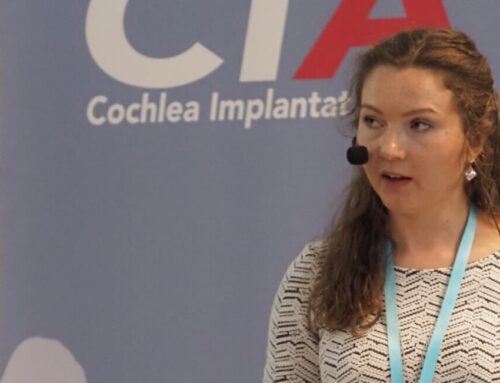CI Families and pandemic
FCEI, the Network for Family-Centred Early Intervention, has been online since February and is also talking about surprising effects of the pandemic on families.

Every two years, the FCEI organizes information exchange meeting in Bad Ischl to discuss the early support of children with hearing impairment. The last meeting took place in 2018 and another was planned for 2020, which had to be postponed due to Covid-19 pandemic: first to spring 2021, but meanwhile the organisers hope for 2022.
In the meantime, in order to offer information and maintain networking, the FCEI has been organising a series of online meetings called “The Parents’ Perspective” since February 2021. The first one was dedicated to the question of influence of the pandemic restrictions on the development of hearing-impaired children and the situation in which their families are. Five mothers and one father from Europe, South Africa, New Zealand and the Middle East had their say.
A stressful lockdown
Leila Abbasi Dezfully from Iran explained what many parents agree about: “For us the situation is relatively good, as we now have experience with it and have a good network. It´s much harder for those families, for whom all this is completely new.” When the necessary treatment of hearing is delayed because of a lockdown. When decisions on implantation and appropriate support measures have to be made without information exchange with experienced parents. Or when clinics had to delay and cancel surgeries and appointments during the pandemic.
However, the “golden phase” of hearing-language development and its time limitation does not only make parents stressed in the process of decision-making. The British Juliet Viney observes that the increased conversations within the family have improved the communication skills of her hearing-impaired daughter in the lockdown. However, the real tests showed deterioration in her grammar and pronunciation. Presenter Trudy Smith, herself a teacher and therapist for people with hearing impairment in Australia, explained different language use in school or therapy: “The children also need somewhat more demanding language to develop.”
A problem rarely comes alone
In Austria, where most CI users use a system from the domestic manufacturer MED-EL, maintenance, service, fitting, upgrades and accessory sales have been possible without interruption during pandemic. However, CI users from other countries and regions complained at the meeting about the impact of the pandemic-related restrictions on technical support. For example, Beenum Mansoor from Pakistan complained about a supply gap of six months in Dubai, where she lives with her family. During this time, she could neither buy spare parts nor have the processor’s setting adjusted, as the service centre of the manufacturer of her son´s CI was closed for this period. In the end, she bought an urgently needed replacement cable online in India and had it sent to Dubai, which is over 2,000 kilometres away!
On the other side of the Gulf, in Iran, the pandemic and lockdown happened next to the trade embargo that the US increasingly tightened from 2018 [1]. Companies based in the US and companies that produce with US components are not allowed to deliver to Iran. This also affects the large parcel services that are otherwise used to transport products and repair parts. In response to the embargo, Iran has tightened import regulations. Leila Abbasi Dezfully talks of months of delivery problems, even for batteries, and skyrocketing prices: “Everything costs ten times more than before.”
Pandemic brings fathers on board
“Our children always thought that, because I was a housewife, I didn’t work. Now, they have actually seen that I have work at home; and that brownies in the cupboard and food on the table aren´t there by magic,” laughs Beenum Mansoor, a mother of two from Pakistan. “So, the lockdown was also a good time for me.”
Distance learning is exhausting, but the lockdown has also brought the families a break and better quality of life: more time to nurture relationships, to play games, read and go for walks together. The parents agreed that they had become aware of this, especially in the first period of lockdown. From the perspective of educators and therapists, the lockdown also had some positive aspects. “I feel privileged because I feel closer to families through distance learning: we virtually come into the living room and have contact with the whole family,” commented one audience member. Therapist Trudy Smith added: “This allows the fathers to participate in the therapy sessions as well. I think the mothers also welcome the fact that both parents can now participate!”
Information about the FCEI concept can be found at www.fcei.at. Under “Models of Practice” you will find recordings of past meetings and information about the upcoming FCEI online meetings. Information about hearing loss and contact with other people with hearing impairment can also be found at www.hoerverlust.at and at our association www.ci-a.at.
What does FCEI mean?
The abbreviation stands for “Family Centered Early Intervention”. This refers to support for hearing-impaired and deaf children, with focus on the situation and its impact on the entire family. The entire families recieve counceling so that the development of the children in the family can be supported in the best possible way.
Who is the FCEI?
The international, multidisciplinary group that includes professionals with or without hearing impairment, parents and stakeholders who want to further develop and promote the concept of FCEI based on current scientific findings. In Austria, the FCEI is supported by the Institute for Sensory and Speech Neurology at the hospital Barmherzige Brüdern in Linz, where the established early support team FLIP works according to the FCEI concept.
What does the FCEI do?
The first FCEI meeting took place in Bad Ischl in 2012, welcoming participants from ten nations. The consensus document that was developed at that time was published in the Journal of Deaf Studies and Deaf Education, a professional journal on education systems for the hearing impaired. It is now available in eight languages and American Sign Language on the FCEI website. This meeting was held every two years until the outbreak of the Covid-19 pandemic. Since 2019, update of the consensus paper is in progress. The idea of the FCEI has also been carried forward by means of regional conferences, for example in Africa.
[1] The EU has also imposed sanctions against Iran, but these are limited to certain products: certain metals, military equipment and similar products.






